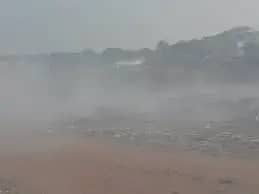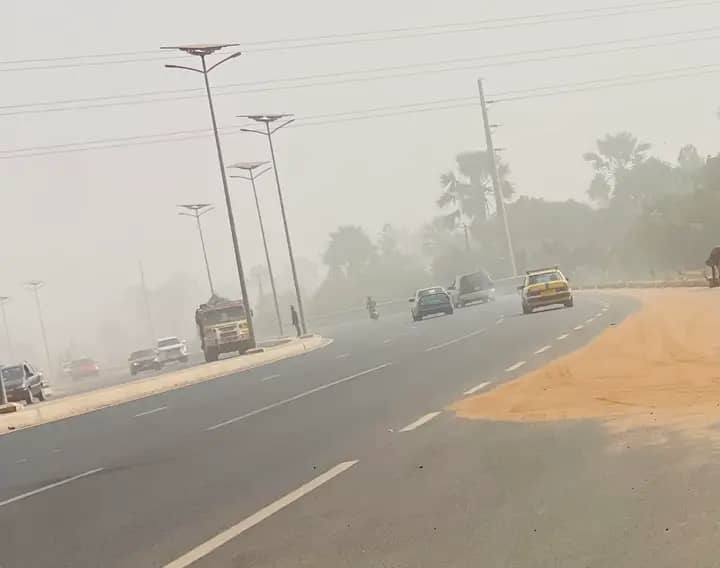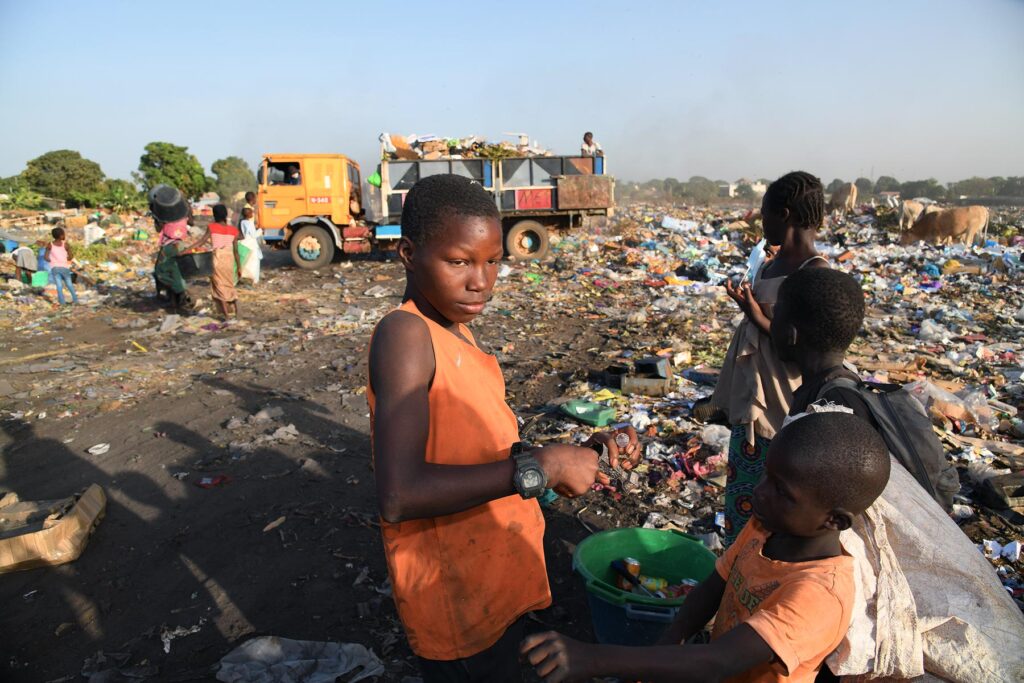
The Gambia is grappling with an alarming rise in air pollution, placing the health of its 2.7 million citizens in serious jeopardy. The escalating pollution levels threaten to increase the incidence of respiratory diseases, prompting the Ministry of Health to issue a public advisory urging citizens to take protective measures, such as wearing masks, to shield themselves from the harmful effects of toxic air.
A Growing Concern
AlhagieJallow, a Gambian returning from Germany, stands beneath a mango tree in the bustling Westfield area of Banjul, wearing a light-coloured mask. “I always wear a mask when I visit my home country because I believe the air is dangerously polluted,” Jallow says, expressing growing concern about the deteriorating air quality.
“The government must address the importation of used vehicles from Europe, which are emitting harmful carbon monoxide into the air.”
Jallow’s worries reflect a broader sentiment among Gambians who blame the influx of second-hand vehicles, often outdated and more polluting than newer models—for the worsening air quality.
“These vehicles are no longer fit for use in Europe, but they’re being sold here, contributing to the toxic air we breathe,” he adds.
Health Risks on the Rise
Yorro Camara, also donning a mask outside a local restaurant, shares his concern.
“The air is polluted, and it’s dangerous for our health. People are coughing more than ever. Wearing a mask has become essential. Everyone should take this precaution to avoid lung diseases,”he urges. “This air is deadly; if we don’t act now, we could face more severe health crises.”
Fatou Marr, recently discharged from the hospital, attributes her health issues to the worsening air quality. “I’ve been feeling sick since December 15, when the polluted air really started battering the country,” she says, referring to the spike in pollution levels.

“I just got back from the hospital seeking medication for a headache. I believe it’s the dust in the air making everything worse. It’s a common cold, but the air is exacerbating the problem.”
In response to the growing health threat, the Ministry of Health issued a statement on December 18, 2024, warning the public of the severe health risks associated with the polluted air. “Recent reports this morning indicate that air pollution levels are rising, reaching alarming levels, predominantly in urban areas,”the statement reads.
“Exposure to this polluted air can lead to severe health issues, including respiratory problems, allergies, and heart conditions.”
The Ministry has advised citizens to take precautionary steps to mitigate the harmful effects of poor air quality.
“Limit outdoor exposure, especially for those with co-morbidities. Mask up, wear glasses while in town, drink plenty of water to stay hydrated, and keep doors and windows closed to block outdoor air pollution. These simple precautions can go a long way in protecting yourself and your family,” the statement urges.
Expert Insights
Medical experts are sounding the alarm about the dangers of air pollution.
Balla Jammeh, a health officer, attributes the heightened pollution levels in The Gambia to a combination of seasonal factors and human activities.
The dry season brings the Harmattan winds from the Sahara Desert, carrying dust particles across West Africa, including The Gambia. This, combined with urban pollution from vehicle emissions, industrial activities, and the burning of biomass for cooking, significantly deteriorates air quality.
Jammeh emphasises the grave health implications, noting that prolonged exposure to these pollutants can damage vital organs, particularly the lungs and heart.

“The lungs are most vulnerable to the fine particles and gases in the air,”Jammeh warns. “Pollution can cause respiratory conditions like asthma, bronchitis, and chronic obstructive pulmonary disease (COPD), and prolonged exposure increases the risk of lung cancer.”
The dangers extend beyond the lungs – pollution also affects the cardiovascular system, contributing to heart attacks, strokes, and other heart-related diseases. The brain is at risk too, with studies linking pollution to cognitive decline, dementia, and mental health conditions such as depression and anxiety.
Environmental Impacts
Muhammed Drammeh, an environmental activist, says the primary causes of the worsening air pollution include poor waste management, emissions from vehicles, industrial activities, and the burning of fossil fuels and biomass.
“Air pollution harms ecosystems by altering soil and water chemistry, damaging crops, and reducing biodiversity,” Drammeh explains. “It accelerates climate change and compromises human and wildlife health.”
He warns that if unaddressed, this environmental destruction will lead to biodiversity loss, increased climate vulnerabilities, reduced agricultural productivity, and health crises, all of which will undermine economic and social development.
Rising Death Toll
Reports from the World Health Organisation (WHO) and the Gambian government confirm that air pollution in The Gambia has worsened in recent years, leading to a significant uptick in respiratory-related hospital visits.
In 2023 alone, over 200 deaths were directly linked to air pollution-induced respiratory and cardiovascular diseases, with children, the elderly, and those with pre-existing health conditions being the most vulnerable.
The air quality index (AQI) in key urban areas like Banjul and Serrekunda frequently reaches hazardous levels, well beyond the recommended safe limits set by the WHO. During the Harmattan season, which typically lasts from November to February, air pollution spikes, exacerbating health issues across the country.
A Call to Action
Experts warn that if the situation continues unchecked, the long-term health costs both in terms of medical expenses and premature deaths could be devastating for the country. The government, alongside environmental and health organisations, is urged to implement stricter vehicle emission standards, promote cleaner energy sources, and enhance public awareness about the dangers of air pollution.
By Adama Makasuba










Recent Comments